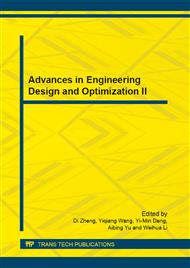[1]
J.N.D. Gupta, K. Krüger, V. Lauff, F. Werner and Y.N. Sotskov: Computers & Operations Research, Vol. 29 (2002) No. 10, pp.1417-39.
DOI: 10.1016/s0305-0548(01)00040-5
Google Scholar
[2]
D. Alisantoso, L.P. Khoo and P.Y. Jiang: International Journal of Advanced Manufacturing Technology, Vo. 22 (2003) No. 11-12, pp.819-27.
Google Scholar
[3]
H.T. Lin and C.J. Liao: International Journal of Production Economics, Vol. 86 (2003) No. 2, pp.133-43.
Google Scholar
[4]
W. Wang and L.J. Hunsucker: Journal of The Chinese Institute of Industrial Engineers, Vol. 20 (2003) No. 3, pp.295-304 (In Chinese).
Google Scholar
[5]
Arthanari TS, Ramamurthy KG: Opsearch, Vol. 8(1971) No. 1, pp.10-22.
Google Scholar
[6]
M.S. Salvador: Symposium of the theory of scheduling and its applications (New York, USA, 1973), pp.83-91.
Google Scholar
[7]
J.N.D. Gupta: Journal of the Operational Research Society, Vol. 39 (1988) No. 4, pp.359-64.
Google Scholar
[8]
S. A. Brah and L. Loo: European Journal of Operational Research, Vol. 113 (1999), pp.113-122.
Google Scholar
[9]
C. Sriskandarajah and S.P. Sethi: European Journal of Operational Research, Vol. 43 (1989) No. 2, pp.143-60.
Google Scholar
[10]
J. Jungwattanakit, M. Reodecha, P. Chaovalitwongse and F. Werner: Computers & Operations Research, Vol. 36 (2009), pp.358-378.
DOI: 10.1016/j.cor.2007.10.004
Google Scholar
[11]
W.J. Guo: Algorithms for two-stage flexible flow shop scheduling with fuzzy processing times, Unpublished master dissertation, Nanjing University of Science & Technology (2006).
Google Scholar
[12]
C.Y. Lee, R. Uzsoy and L.A. Martin-Verga: Operations Research, Vol. 40 (1992), pp.764-775.
Google Scholar
[13]
Y. Ikura and M. Gimple: Operations Research Letters, Vol. 5 (1986), pp.61-65.
Google Scholar
[14]
C.S. Sung and Y.I. Choung: European Journal of Operations Research, Vol. 120 (2000), pp.559-574.
Google Scholar
[15]
V. Chandru, C.Y. Lee and R. Uzsoy: International Journal Production Research, Vol. 31 (1993), pp.2097-2122.
Google Scholar
[16]
C.N. Potts, V.A. Struserich and T. Tautenhahn: Journal of Scheduling, Vol. 4 (2001), pp.25-51.
Google Scholar
[17]
R. Logendran, S. Carson and E. Hanson: Int. J. Production Economics, Vol. 96 (2005), pp.143-155.
Google Scholar
[18]
L.M. He, S.J. Sun and R.Z. Luo: Chinese Journal of Engineering Mathematics, Vol. 25 (2008) No. 5, pp.829-842 (In Chinese).
Google Scholar
[19]
W. S Sun: Industrial Engineering Journal, Vol. 11 (2008), No. 2, pp.58-65. (In Chinese).
Google Scholar
[20]
D. Dannenbring: Management Science, Vol. 23 (1977), pp.1174-1182.
Google Scholar
[21]
X.F. Li and X.M. Dai: Computer Engineering, Vol. 28 (2002), No. 6, pp.152-153. (In Chinese).
Google Scholar
[22]
Z.T. Li, Q.X. Chen and N. Mao: submitted to Chinese Journal of Mechanical Engineering.
Google Scholar


